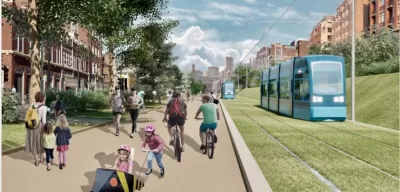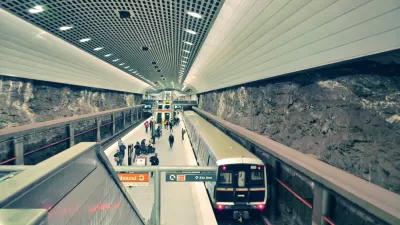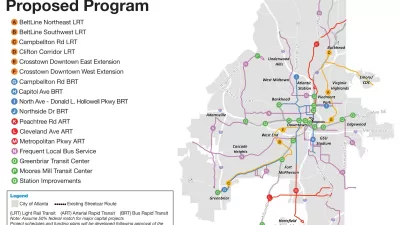MARTA has drastically reduced its plans to construct new rail transit, but one project still has political support from the top at City Hall.

The Board of Directors for the Metropolitan Atlanta Rapid Transit Authority (MARTA) voted to advance the eastern extension of the Atlanta Streetcar to Ponce City Market—a decision all the more notable at a time when MARTA is cutting back on rail expansion plans enabled by More MARTA in favor of bus rapid transit.
Maria Saporta reports on the board’s April 13 decision to move forward with the Atlanta Streetcar extension, noting that political support from Mayor Andre Dickens and Atlanta BeltLine Inc. (ABI) leaders helped ensure the streetcar extension wasn’t replaced with a bus route.
“City of Atlanta voters overwhelmingly passed the More MARTA half-penny in 2016. It is estimated that it will cost $230 million to extend the Atlanta Streetcar to Irwin Street where it will travel along the BeltLine north to Ponce de Leon Avenue. Because city taxpayers are paying for the 2.25-mile extension, the MARTA board rightfully followed the desire of Atlanta leaders,” writes Saporta.
The streetcar expansion is not without its opponents, however. “Both Central Atlanta Progress, Atlanta city councilmember and the Atlanta Downtown Neighborhood Association oppose the project as currently designed,” reports Saporta.
The source article, linked below, is obviously pro-rail. Saporta is writing to celebrate the persistence of one rail project. “Unfortunately, the Atlanta Streetcar has been unfairly maligned by public perception,” adds Saporta.
Rail expansion plans are on the retreat in other U.S. cities as transit planners grapple with the increasing costs of construction. Austin, for example, recently announced drastic reductions of rail planned through the Project Connect long-term capital expansion program.
FULL STORY: Celebrating MARTA’s vote to advance the Streetcar along the BeltLine

Maui's Vacation Rental Debate Turns Ugly
Verbal attacks, misinformation campaigns and fistfights plague a high-stakes debate to convert thousands of vacation rentals into long-term housing.

Planetizen Federal Action Tracker
A weekly monitor of how Trump’s orders and actions are impacting planners and planning in America.

San Francisco Suspends Traffic Calming Amidst Record Deaths
Citing “a challenging fiscal landscape,” the city will cease the program on the heels of 42 traffic deaths, including 24 pedestrians.

Defunct Pittsburgh Power Plant to Become Residential Tower
A decommissioned steam heat plant will be redeveloped into almost 100 affordable housing units.

Trump Prompts Restructuring of Transportation Research Board in “Unprecedented Overreach”
The TRB has eliminated more than half of its committees including those focused on climate, equity, and cities.

Amtrak Rolls Out New Orleans to Alabama “Mardi Gras” Train
The new service will operate morning and evening departures between Mobile and New Orleans.
Urban Design for Planners 1: Software Tools
This six-course series explores essential urban design concepts using open source software and equips planners with the tools they need to participate fully in the urban design process.
Planning for Universal Design
Learn the tools for implementing Universal Design in planning regulations.
Heyer Gruel & Associates PA
JM Goldson LLC
Custer County Colorado
City of Camden Redevelopment Agency
City of Astoria
Transportation Research & Education Center (TREC) at Portland State University
Jefferson Parish Government
Camden Redevelopment Agency
City of Claremont




























